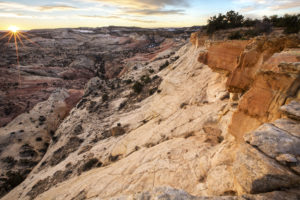Antiquities Act of 1906

Signed into law by President Theodore Roosevelt in 1906, the Antiquities Act was the first federal regulation to protect the cultural and natural resources of the United States. It resulted from concern over decades of looting and destruction of Native American sites in the West.
Deterring Pot Hunters
During the late 1800s, calls began for the preservation of the country’s vast archeological sites. Looters known as “pot hunters” removed artifacts to add to their own private collections, while other artifacts were destroyed by careless digging. The movement to protect America’s antiquities spurred a flurry of bills in Congress at the turn of the century; however, lawmakers could not agree how to protect archaeological sites on public lands.
In 1906, Congressman John F. Lacey of Iowa introduced the Antiquities Act after traveling to several sites in the Southwestern United States that had been ravaged by pot hunters. His personal testimony was bolstered by a report by anthropologist Edgar Lee Hewett that detailed the cultural and scientific value of the sites. President Roosevelt, who strongly favored conserving the country’s national resources, supported the legislation and quickly signed it into law.
The Text of the Statute
As set forth in the statute, the aim of the Antiquities Act was “… the protection of objects of historic and scientific interest.” Section 1 of the Antiquities Act made it illegal to “appropriate, excavate, injure, or destroy any historic or prehistoric ruin or monument, or any object of antiquity, situated on lands owned or controlled by the Government of the United States.” The punishment was a fine of not more than five hundred dollars and/or imprisonment for a period of not more than ninety days.
The Antiquities Act also gave the President the power to set aside certain public lands as national monuments. Section 2 specifically authorized the President to “declare by public proclamation historic landmarks, historic and prehistoric structures, and other objects of historic or scientific interest that are situated upon the lands owned or controlled by the Government of the United States to be national monuments.” The statute also authorized the President to reserve or accept private lands for the same purpose.
The First National Monuments
On September 24, 1906, President Roosevelt designated Devils Tower in Wyoming as the country’s first national monument. Roosevelt continued to assert his authority under the Antiquities Act, also protecting the Petrified Forest and Montezuma Castle in Arizona and El Morro in New Mexico that same year. During the remainder of his time in office, Roosevelt would issue executive proclamations for 18 sites, including the creation of the Grand Canyon National Monument. The Antiquities Act has subsequently been used by 16 presidents to create more than 100 national monuments.
Previous Articles
SCOTUS Decision in Bowe v. United States Is First of the 2026 Term
by DONALD SCARINCI on February 5, 2026
In Bowe v. United States, 607 U.S. ___ (2026), the U.S. Supreme Court held that Title 28 U.S.C. § ...
SCOTUS Rules State Can’t Immunize Parties from Federal Civil Liability
by DONALD SCARINCI on January 29, 2026
In John Doe v. Dynamic Physical Therapy, LLC, 607 U.S. ____ (2025) the U.S. Supreme Court held that...
Supreme Court to Address Racial Discrimination in Jury Selection
by DONALD SCARINCI onWhile the U.S. Supreme Court has concluded oral arguments for the year, it continues to add cases t...
The Amendments
-
Amendment1
- Establishment ClauseFree Exercise Clause
- Freedom of Speech
- Freedoms of Press
- Freedom of Assembly, and Petitition
-
Amendment2
- The Right to Bear Arms
-
Amendment4
- Unreasonable Searches and Seizures
-
Amendment5
- Due Process
- Eminent Domain
- Rights of Criminal Defendants
Preamble to the Bill of Rights
Congress of the United States begun and held at the City of New-York, on Wednesday the fourth of March, one thousand seven hundred and eighty nine.
THE Conventions of a number of the States, having at the time of their adopting the Constitution, expressed a desire, in order to prevent misconstruction or abuse of its powers, that further declaratory and restrictive clauses should be added: And as extending the ground of public confidence in the Government, will best ensure the beneficent ends of its institution.





